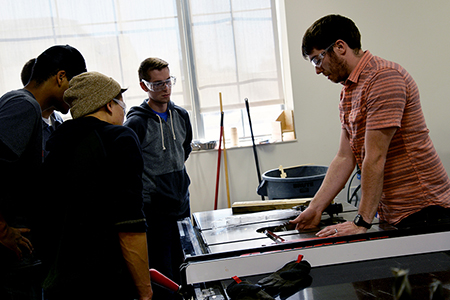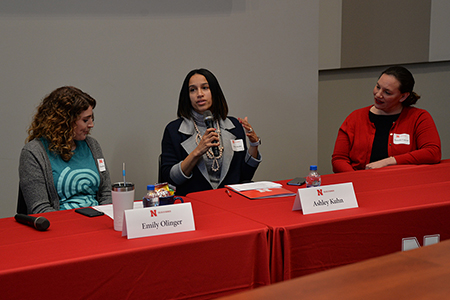The Innovation and the Future of Work conference brought together more than 200 students and business professionals for workshops in international business, artificial intelligence, human resources and more at the Nebraska Innovation Campus Conference Center held February 16. Coordinated by the Undergraduate Women in Business and the College of Business, the annual conference broadened its scope this year to examine topics and trends facing men and women in the workplace.
Keynote speaker Suji Park, an international entrepreneur who built a career around her love of fine food, shared how the marketplace demands innovation and fosters an environment where entrepreneurial-minded people will succeed. Park knew she wanted to open a restaurant and create a product to sell in stores because she saw an opportunity in the increasing consumer demand for restaurant-quality foods at home.
“Entrepreneurs are different from other people. Your gut will tell you something, and you just have to do it. I saw a need and took action,” she said.
She recently opened the first Suji’s Korean Grill in Omaha and runs Suji’s Korean Cuisine, a line of refrigerated and frozen meals sold in Costco, Target, Walmart, Whole Foods as well as at the University of Nebraska–Lincoln. In 2016, Park won the Silver Stevie Entrepreneur of the Year Award, recognizing her as one of the top female entrepreneurs in the world. She serves on two advisory boards at the university including the Nebraska Center for Entrepreneurship.
 Students and business professionals took a tour of the Nebraska Innovation Studio makerspace during the conference.
Students and business professionals took a tour of the Nebraska Innovation Studio makerspace during the conference.
“Everything I do is to innovate,” said Park, who studied business, fashion and culinary arts, and learned that running a business means making adjustments as she goes. “Innovation is learning from failures. You learn more from your failures than your successes.”
She shared some of the lessons she learned along the way. Park found the value in hiring the right people as she cannot accomplish all she wants on a global scale alone.
“You need to make the right team so you can move to the next level. That’s my business goal – to have the right people in the right positions. If they’re happy and good at what they do, the business can thrive,” she said.
Park also shared how professionals must invest time in doing what makes them feel good. For Park, balancing a healthy life and work requires regular exercise, turning off her phone and getting adequate sleep.
Several workshop sessions held at the conference examined similar topics: balancing work and home, considering communication across cultures and predicting what employers and employees may encounter in the workplace and job duties in the future.
Computer programming and coding is an increasingly in-demand skill in all fields, not just the tech industry, said Libby Gentry, a senior computer science and management major who led the Coding 101 workshop. Programming languages are universal, Gentry explained, and with globalization and growing technology, jobs of the future will require coding skills.
 Emily Olinger of Spreetail, Ashley Kuhn of White Lotus Group and Danielle Conrad of ACLU of Nebraska talk about future expectations in the workplace in the conference’s closing panel discussion.
Emily Olinger of Spreetail, Ashley Kuhn of White Lotus Group and Danielle Conrad of ACLU of Nebraska talk about future expectations in the workplace in the conference’s closing panel discussion.
The conference concluded with a panel discussion about the future of work with Danielle Conrad, ACLU of Nebraska executive director; Ashley Kuhn, White Lotus Group executive vice president; Emily Olinger of Spreetail’s People and Culture team; and Chandra Schwab, international business lecturer in the College of Business. The panel brought their diverse perspectives to discuss how the worker and workplace of the future will evolve. The panelists said businesses and employees will likely see more agile work environments, changes in office layouts, a multigenerational workforce and women continuing to progress toward equal pay.
Although they had different ideas about the exact role of technology in future careers, the panelists agreed men and women will continually have to learn new skills to stay relevant and employed. They echoed what Director of the Johnny Carson Center for Emerging Media Arts Megan Elliott said in her Artificial Intelligence workshop: The future will require workers to commit to lifelong learning, not just “knowing.”
In addition, companies will have to look at the benefits they offer to retain their best employees. The next generation is less likely to stay at a company when there are no pensions or long-term commitments.
“We are already seeing companies offer more varied benefits aimed at life-work balance, not work-life balance,” said Kuhn.
The conference was sponsored by Ameritas, Talent Plus and the Lincoln Community Foundation.
Published: February 21, 2018